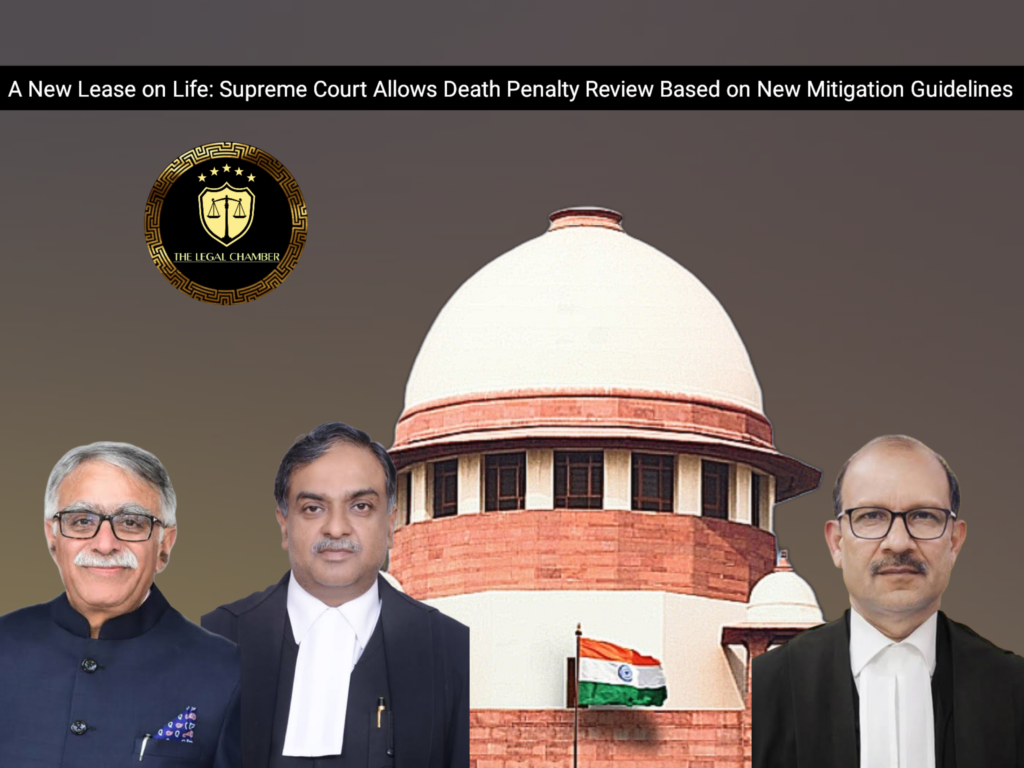
This Supreme Court judgment holds that its extraordinary power under Article 32 of the Constitution can be invoked to reopen the sentencing stage in death penalty cases that have attained finality. This is permissible to remedy a clear breach of the procedural safeguards for individualized sentencing mandated in Manoj v. State of M.P., which are integral to the fundamental rights under Articles 14 and 21. The Court clarified that such judicial declarations operate retrospectively.
Facts Of The Case:
The case concerns the petitioner, Vasanta Sampat Dupare, who was convicted and sentenced to death for the 2008 kidnapping, sexual assault, and murder of a four-year-old girl in Nagpur. His conviction and death sentence were confirmed by the High Court in 2012 and ultimately upheld by the Supreme Court in 2014, with a subsequent review petition dismissed in 2017. Following this, mercy petitions filed with the Governor of Maharashtra and the President of India were both rejected in 2022 and 2023, respectively. The petitioner then approached the Supreme Court again under Article 32 of the Constitution, arguing that his death sentence was unconstitutional as it was imposed without the benefit of the comprehensive sentencing framework later established in the 2022 case of Manoj v. State of M.P. He contended that this new protocol, which mandates detailed psychiatric, psychological, and socio-economic assessments for individualized sentencing, constituted a substantive change in law. He further relied on new medical evidence suggesting intellectual disability and mental illness. The core legal question was whether a writ petition under Article 32 is maintainable to reopen a final death sentence based on a subsequent judicial development that crystallized essential procedural safeguards.
Procedural History:
The petitioner was initially convicted and sentenced to death by the Trial Court in 2010. However, the High Court, in confirmation proceedings, set aside the conviction in 2011 due to a denial of an effective defense and remanded the case solely for cross-examination of witnesses. Upon remand, the Trial Court again convicted him and re-imposed the death sentence in 2012, which was affirmed by the High Court later that year. The Supreme Court subsequently dismissed his criminal appeal in 2014 and his review petition in 2017, thereby finally upholding the death sentence. Following this judicial exhaustion, his mercy petitions to the Governor and the President were rejected in 2022 and 2023, respectively. The present Writ Petition under Article 32 of the Constitution was then filed directly before the Supreme Court, challenging the sentence’s validity based on subsequent legal developments.
READ ALSO :Supreme Court Backs Discom: Upholds Right to Encash Bank Guarantee in Delayed Solar Project
Court Observation:
The Court observed that the irreversible nature of the death penalty demands the most rigorous constitutional scrutiny, making Article 32 a continuing safeguard even after a sentence attains finality through appeal, review, and clemency. It held that the sentencing guidelines mandated in Manoj v. State of M.P., which require the State to produce comprehensive mitigation reports on an accused’s socio-economic, psychiatric, and psychological background, are not mere administrative formalities but indispensable procedural safeguards integral to the fundamental rights of equality (Article 14) and life (Article 21). The Court further opined that such judicial declarations of constitutional procedure operate retrospectively, and procedural finality cannot stand in the way of curing a constitutional wrong. Consequently, it affirmed its plenary power under Article 32 to reopen the sentencing stage in concluded capital cases to ensure that the ultimate punishment is imposed only through a procedurally fair and individualized process.
Final Decision & Judgement:
The Supreme Court allowed the writ petition, setting aside the death sentence affirmed in 2017. The Court held that Article 32 of the Constitution empowers it to reopen the sentencing stage in capital cases where the mandatory procedural safeguards outlined in Manoj v. State of M.P. were not followed. Consequently, the matter was remitted to the Supreme Court itself for a fresh hearing on the sentence alone, to be conducted in strict conformity with the Manoj guidelines. The Court clarified that its intervention was strictly confined to the issue of sentence and left the finding of guilt completely untouched.
Case Details:
Case Title: Vasanta Sampat Dupare vs. Union of India & Ors. Citation: 2025 INSC 1043 Criminal Appeal No.: Writ Petition (Criminal) No. 371 of 2023 Date of Judgement: August 25, 2025 Judges/Justice Name: Vikram Nath & Sanjay Karol, and Sandeep Mehta
Download The Judgement Here